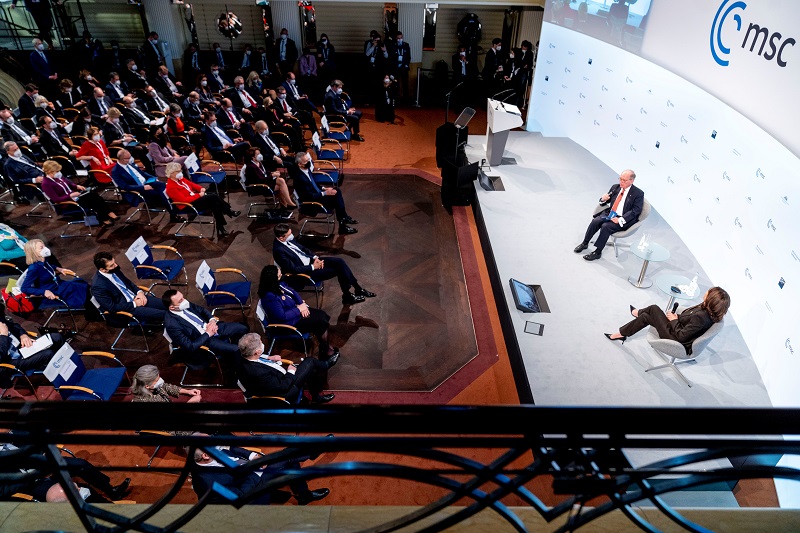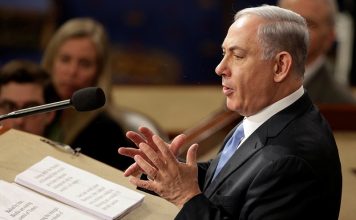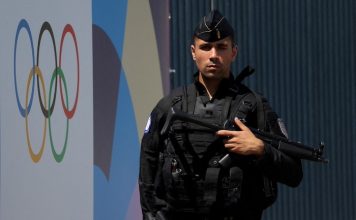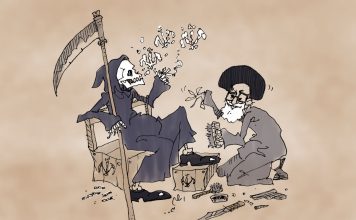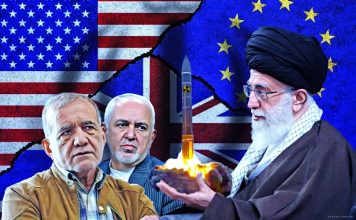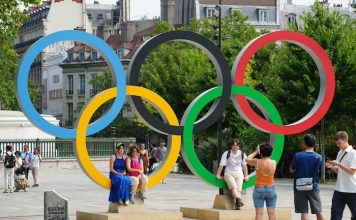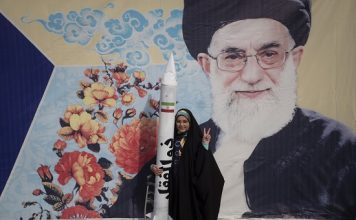By Ahmad Rafat
The Islamic Republic has been excluded from this year’s Munich Security Conference (MSC), held from 17 to 19 Feb.
The MSC’s decision marks the first time Iran and Russia will not have representatives at the conference.
The MSC, “the world’s leading forum for debating international security policy,” will host 450 senior decision-makers and leaders worldwide this year.
Excluding the Islamic Republic from this year’s conference is a significant victory for the Iranian pro-democracy movement and has further pushed the country into isolation.
[aesop_image img=”https://kayhanlife.com/wp-content/uploads/2023/02/2022-02-19T122424Z_1832533913_RC20NS917180_RTRMADP_3_GERMANY-SECURITY-MUNICH-HARRIS.jpg” panorama=”off” credit=”Andrew Harnik/REUTERS” align=”center” lightbox=”off” captionsrc=”custom” caption=”FILE PHOTO: Munich Security Conference Chairman Wolfgang Ischinger, accompanied by Vice President Kamala Harris, speaks during the Munich Security Conference, in Munich, Germany February 19, 2022. ” captionposition=”left” revealfx=”off” overlay_revealfx=”off”]
The democracy movement scored a more significant win when MSC invited two prominent members of the opposition, Crown Prince Reza Pahlavi and Masih Alinejad, a journalist and women’s rights activist, to the conference.
Iran Exiled Opposition Figures in Talks To Unite Against Government
The Islamic Republic was also excluded from the last World Economic Forum, held between Jan. 16 and 20 in Davos, Switzerland.
Instead, the forum invited two members of the Iranian opposition, Ms. Alinejad and Iranian-British actress and political activist Nazanin Boniadi, to the forum.
Actress Nazanin Boniadi Speaks Out After Mahsa Amini Death, Iran Protests
U.S. State Department Spokesman Edward (Ned) Price recently hinted that Washington might be open to establishing direct contact with opposition groups outside Iran.
Mr. Price’s comments followed Boniadi’s recent meetings with senior U.S. officials, including Vice President Kamala Harris, Secretary of State Antony Blinken, and National Security Advisor Jake Sullivan.
Ned Price said the U.S. aimed to better understand the Iranian diaspora’s views.
“We are listening to the people of Iran. We are hearing ideas from, in this instance, the diaspora. And we are seeking to find ways to support their movement and their aspirations,” Price said during the State Department Press briefing on Feb. 14.
On Nov. 11, 2022, French President Emmanuel Macron held a meeting at the Élysée Palace with Masih Alinejad; human rights activist Ladan Boroumand; Roya Piraei, whose mother Minoo Majidi was killed during protests on Sept. 20 in Kermanshah; and Shima Babaei, a former political prisoner whose father Ebrahim Babaei has been missing since December 2021.
France’s Macron: Children of Iran’s Revolution Carrying Out Their Own Revolution
All of these high-level meetings in recent months — which have occurred since the start of the “Woman, Life, Freedom” revolution — could signal a turning point in Western governments’ approach to the Islamic Republic, or at least in U.S. and European policy on Iran.
Western countries — or at least some American and European officials — seem ready to bet on a different horse, given the ongoing protests in Iran, the worsening of the political crisis inside the Islamic Republic power structure, and the gradual collapse of forces that until now supported the regime unequivocally.
They are mindful of their relations with the post-Islamic Republic of Iran.
The West has used this approach in the past by courting opposition groups poised to take power after the fall of a ruling regime to maintain its ties and position with a future governing system.
Meanwhile, Tehran has criticized the decision by the MSC’s chair, Dr. Christoph Heusgen, not to invite the Islamic Republic’s officials to this year’s conference and instead ask a member of the Iranian opposition to attend the event.
During his weekly press briefing on Feb. 13, Iranian Foreign Ministry Spokesperson Naser Kanaani said: “If the Munich Conference aims to establish security in the region and the world, then not inviting some countries [Iran and Russia] is a selective act with political objectives.”
Some Islamic Republic analysts said Dr. Heusgen’s decision was “unexpected.”
[aesop_image img=”https://kayhanlife.com/wp-content/uploads/2023/02/WhatsApp-Image-2023-02-15-at-20.17.08.jpg” panorama=”off” credit=”KL./Behnam Mohammadi” align=”center” lightbox=”off” captionsrc=”custom” caption=”Entry Denied to the Islamic Republic of Iran at Munich Security Conference” captionposition=”left” revealfx=”off” overlay_revealfx=”off”]
Iranian officials expected Europe to soften its stance on Tehran after the street protests had slowed and authorities released a few protesters arrested in the past five months.
Russia’s war on Ukraine will be at the top of the MSC’s agenda this year. The conference will also discuss Tehran-Moscow’s military cooperation in Ukraine.
Tehran cannot ignore the MSC’s refusal to invite the Islamic Republic officials to this year’s conference and asking members of the opposition to attend the event instead.
By excluding Islamic Republic officials from this year’s security conference and inviting members of the opposition instead, MSC could send several messages to Tehran which it cannot ignore, most significantly one signaling the regime’s lack of legitimacy.
The Iranian people have questioned the legitimacy of the Islamic Republic for a long time, a fact that has been reinforced since mid-September, eliminating any doubts that may still exist.
Many in the West have reached the same conclusion.
The MSC’s decision to exclude the Islamic Republic officials from the conference and invite representatives of the Iranian opposition instead demonstrated increased pressure on the regime.
The third and probably the most significant message sent by MSC’s decision strengthens the view that the Islamic Republic cannot be part of the security solutions, particularly in the Middle East.
It is, in fact, the principal culprit for creating insecurity and instability in the region.
Prince Reza Pahlavi : ‘The Alternative to the Islamic Republic is the Iranian nation’
OPINION: The Solution to the ‘Iran Problem’ is Regime Change

